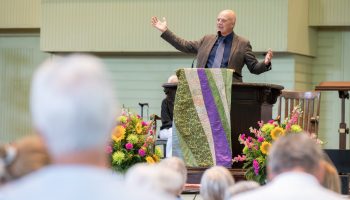MARY LEE TALBOT – STAFF WRITER
In the summer of 1979, the Rev. Fred Craddock served as chaplain of the week at Chautauqua and told a story that stuck with the Rev. George Wirth ever since. Wirth, a retired Presbyterian minister, served as the preacher for the 9 a.m. Monday ecumenical worship service in the Amphitheater. His sermon title was “Who Cares?” and the scripture was Luke 10: 25-37, the story of the Good Samaritan. Wirth is the author of the liturgies for Monday through Friday this week.
Craddock, Wirth said, told the story of preaching in a church in Oklahoma. After the service he noticed a woman hanging up her choir robe. Craddock told her how much he enjoyed the anthem and she responded, “I am hanging it up.”
Thinking that she meant her choir robe, Craddock asked how she was doing. The woman replied, “I’m hanging it up. I am quitting the choir and leaving the church. I looked out at the congregation and the choir and I thought, ‘Who cares?’ Who really cares about me?”
Craddock tried to convince her that he cared and others did, too. “Reverend, name one,” she said. Then Craddock looked around the church and said, “I am asking for names. May I give her your name?”
“That question is still rumbling around my brain,” Wirth said. “Do we really care about being a loving, compassionate community? Shouldn’t that be at the center of what we do?”
Wirth recounted the story of the lawyer who approached Jesus and asked what he had to do to receive eternal life.
“Luke wrote that the lawyer was putting Jesus to the test, trying to catch him off guard and make a scene,” Wirth said.
But Jesus turned the tables on the lawyer. Jesus asked him what was in the law and the lawyer replied to love God and to love your neighbor.
“I think the lawyer did not like the tone of voice Jesus used,” Wirth said. “Then Jesus put the lawyer on the spot and asked ‘Who is your neighbor?’ and told the parable of the Good Samaritan.”
According to the parable, robbers attacked a man on the road, and after robbing him and stripping him naked, left him to die. A priest and a Levite passed by the man on their way from Jerusalem to Jericho.
“We don’t know why they passed by,” Wirth said. “Some preachers say it was because the man was unclean because he was bleeding, or maybe they were afraid that they would be attacked. I wonder if they were not in too much of a hurry, they had too many important things to do in Jericho.”
Wirth recalled the Rev. Charles Black, who served with him at First Presbyterian Church in Atlanta as minister to the community. “He taught me how to pay attention to the homeless. He introduced me to hundreds of men and women.”
One evening Wirth was leaving the church about 9 p.m. and a homeless man named John called out to him.
“Preacher, preacher, it’s mighty hot. Sure could use some water,” John said.
Wirth went back into the church and found a cold can of Diet Coke. He took the can out and gave it to John, who took a long sip. John said, “Thanks. Things go better with Coke.”
Wirth said, “I stopped and prayed for John, and gave thanks for Charles, who taught me to stop and pay attention to people in need.”
He continued, “Jesus deliberately chose a Samaritan, an outcast, to take care of the fallen man and pay his expenses. Then Jesus asked the lawyer, ‘Who was his neighbor? Who cared?’ ”
The lawyer was outflanked and said, “The one who showed mercy.” Jesus said to him, “Go and do likewise.”
Wirth told the congregation, “We are all called to care for one another, for the stranger, outcast, poor, sick, knocked down, left behind, treated as inferior like the Samaritan. We struggle today trying to figure out immigration, economic disparity. We know the Lord is calling us to pray and work toward hope, healing and equity across this nation and the world.”
Mother Teresa, quoting St. Therese of Lisieux, told her community, “Christ has no body on earth but yours.”
Wirth said that one person who showed compassion to all children was Fred Rogers. Rogers, a Presbyterian minister, chose television as his pulpit. In 1985, Rogers and his wife, JoAnn, stayed with the Wirths when he came to Chautauqua.
Rogers gave an interview in Norton Hall and then answered questions from the audience. A woman stood up and told Rogers that she and her daughter had watched his show faithfully. The daughter was now grown and was going through a painful divorce.
“The woman broke down and sobbed,” Wirth said. “Rogers got down from the stage and made his way through the audience and they looked at each other and then he put his arms around her. He promised to stay in touch with her, and he did. There was not a dry eye in the house as the Spirit of the Lord moved in the audience.”
Who cares? Fred Craddock, Charles Black, Mother Teresa and Fred Rogers showed the way, Wirth said.
“What is the Lord calling you to do? May I give him your name? Perhaps you can give him your own name.”
The Rt. Rev. V. Gene Robinson, vice president for religion and senior pastor of Chautauqua Institution, presided. Joshua Stafford, Jared Jacobsen Chair for Organist and director of sacred music, played the organ and conducted the Chautauqua Octet. The morning anthem was “Bless the Lord, O My Soul,” by Mikhail Ippolitov-Ivanov, arranged by Arthur C. Becker, sung by the Octet. The postlude was a riff on the theme from “Mr. Rogers’ Neighborhood” played by Stafford. The Gladys R. Brasted and Adair Brasted Gould Memorial Chaplaincy provides support for this week’s services and chaplains.




